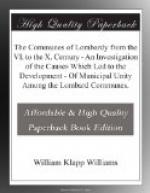But of this no record, hardly mention even appears. When the central government falls and the last of its legions are destroyed or have departed, there seems to be no thought of any other element in society. If the evidence of the law codes did not tell us that a Roman population existed, history would record little to indicate its presence. Not only is even the slightest trace of nationality effaced, but the merging of the old conditions of life into the new seems of too little consequence to merit even an allusion. This state of affairs, as said above, is caused by the annihilation, by the despotic power of the central government, of that middle class which in times of prosperity formed the sinews of the state. Of the other classes, the privileged class, with the exception of the clergy, fell of course with the government which supported it, and the common people possessed no individuality, no power, and hardly any rights. Such, then, was the condition of the towns at the time of the Lombard invasion, a condition of such abasement and such degradation as literally to have no history; a condition which indeed can truthfully be said to merit none.
History tells the story of every great nation on the face of the earth in three short words, growth, supremacy, decline. Vary the theme as you may in the countless histories of countless peoples; subdivide the course of its progress as you will, allowing for different local causes and different local phenomena, the true philosophy of history teaches that no real departure from this natural development is possible. But what if by the violent intervention of some new and entirely foreign force, another development and another life is given to the inanimate ashes of the old? What if some nation, fresh from the woods and fields of the childhood of its growth, come with overwhelming yet preserving strength and infuse new blood into the withered veins of its predecessor? This is the problem we now have before us. How many writers of Italian history have entitled this chapter in its development “A new Italian Nation formed”! It is not the old glories of Rome, which had been Italy, returning; it is a new Italian nation formed. Each word tells a story of its own. It is not the old galvanized to a second life; it is the new superimposed, violently if you will, upon it. We do not hear of Athens or of Rome, of an Alexander or of a Caesar, of a city or of a man. It is an “Italian nation.” It is the individualism of the independent spirit of the North, which “forms” a nation from the exhausted remains of the development of centralization of the South. The new idea of distinct nationality among races of kindred stock was already at work, even though it did not reach a formal expression till the Treaty of Verdun, more than two hundred and fifty years later.




